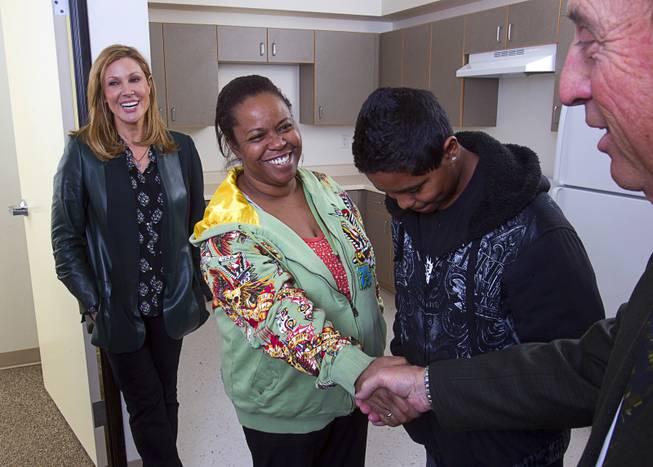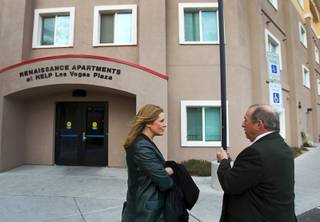
Maria Cuomo Cole, left, chairwoman of HELP USA, smiles as resident and Navy veteran Anita Williams thanks Steve Silverman, regional executive director, at HELP Las Vegas Renaissance Apartments on North Main Street on Tuesday, Feb. 19, 2013. With Williams is her son Joseph Williams, 13.
Friday, Feb. 22, 2013 | 2 a.m.
The homeless are so numerous here you can’t drive past without being reminded that many in the Las Vegas Valley are paycheck away from a similar fate.
The intersection of Foremaster Lane and Main Street has always been known as a hub for the homeless due to nearby services.
For local government, the cluster of destitute has mostly presented an impossible issue — how to stem the growing tide of homeless, many of them military veterans who brought home a variety of mental or physical ailments from the world of warfare.
Yet even here, there exists a haven. A hope. And some signals of change.
Government grants and aid from HELP USA, a national, Brooklyn-based nonprofit agency, have created 50 permanent, plus 160 units of transitional housing in Las Vegas for military veterans.
In its 13 years here, HELP USA has contributed $23 million to combat homelessness in Las Vegas.
This week, Maria Cuomo Cole, chairwoman of the board of HELP USA — which her brother, Andrew, helped found in 1986 to aid New York’s homeless — toured the 3-year-old Renaissance Apartments. There, in a complex of buildings at the southwest corner of Foremaster and Main, HELP USA has 50 permanent apartments for veterans and their families. (It’s the fourth building USA HELP assisted in building; the first building has since been turned over to Catholic Charities.)
Some 4,000 to 5,000 people have used the homes for partial or permanent housing in the past 13 years. Social and psychological services are also offered to residents.
Vegas’ veteran housing, Cuomo Cole added, is the pioneering model HELP USA has used for veteran housing in New Jersey, New York and Philadelphia.
Does it work? Are veterans who stay here moving beyond the addictions and a life that lands them on the streets?
“That depends on an individual’s physical and mental health issues,” Cuomo Cole said. “Some just need a place to stay that they can afford.”
Army veteran Randy Stotler, 55, looks south out of the apartment that Cuomo Cole is touring toward an empty lot where he said he used to live. After serving in Vietnam, Stotler came home and eventually lost his family, he said. For almost three decades, suffering from a bipolar disorder and severe depression, he lived on and off the streets.
His voice quivers when he talks about what it has meant to live in Renaissance.
“It takes a lot of pressure off at night — do I have a place to sleep? Will someone slit my throat or steal my things?”
Stotler advises all veterans who have been through combat, even those who think they are fine, to sign up for help before they are decommissioned.
“Because a lot of these guys may not think they have any problems when they get out, but over time it comes out more and more,” he said. “You want to get them before they slip through the cracks and end up in prison or worse.”
Steve Silverman, who just two weeks ago took over as head of HELP USA-Las Vegas, also served in Vietnam. He believes the young people serving in Iran and Afghanistan are likely to suffer more difficulties than Vietnam-era soldiers because the warfare is so different.
More soldiers these days, he said, appear to be maimed. And many suffer from post-traumatic stress disorder because the danger in the Middle East “is so much closer than what we were used to (in Vietnam).”
In Vietnam, he added, you’d go into a dangerous area but could be flown out via helicopter to a safer base. “In Iran and Afghanistan, nowhere appears to be safe.”
“It’s just an entirely different war,” he added.
In the elevator leaving the fourth-floor apartment, Cuomo Cole smiles and talks to a man and someone who appears to be his son; they have a cart loaded with food and possessions.
But they aren’t moving in. They’re moving out.
“We didn’t need to stay too long,” he says. “We’ve got our own place now, an apartment.”
Cuomo Cole smiles. Sometimes “impossible” is just a word.


Join the Discussion:
Check this out for a full explanation of our conversion to the LiveFyre commenting system and instructions on how to sign up for an account.
Full comments policy